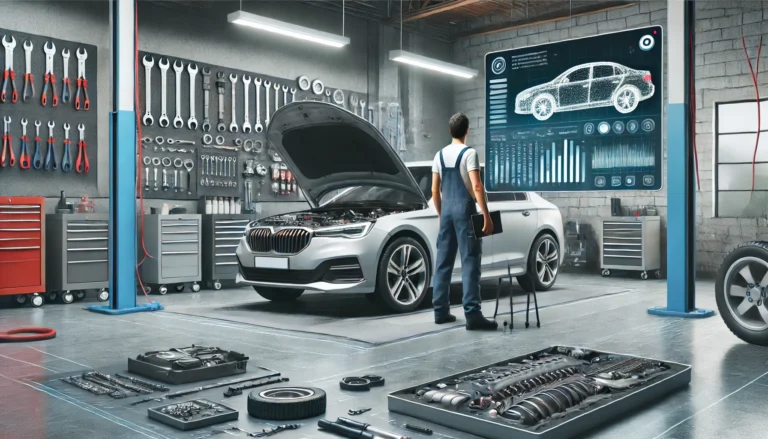The automotive industry is transforming rapidly, and being part of it is exciting. As vehicles become more sophisticated, the demand for professionals in automotive technology is growing like never before. Whether you’re passionate about engines, love solving technical problems, or are excited about working with cutting-edge technology, a career in automotive technology offers numerous paths to explore. This article will explore the various career options in this dynamic field, the education required, and the prospects of automotive technology careers.
What is Automotive Technology?
Automotive technology encompasses designing, developing, maintaining, and repairing vehicles such as cars, trucks, and motorcycles. This field blends mechanical engineering, electronics, and software to create advanced vehicles for personal and commercial use. Automotive technology has come a long way, evolving from primary internal combustion engines to sophisticated machines equipped with computers, sensors, and AI.
Why Pursue a Career in Automotive Technology?
One of the biggest reasons to consider a career in automotive technology is the increasing demand for skilled professionals. As cars become more advanced, there’s a need for people who understand the complexity of modern vehicles. With the growing trend for electric and self-driving cars, the automotive industry is at the forefront of innovation, offering new opportunities for those passionate about cutting-edge technology. In short, this field is expanding and becoming more exciting, with innovations happening at lightning speed.
Types of Careers in Automotive Technology

A wide range of career paths are available in automotive technology, from hands-on repair work to advanced engineering and vehicle design. Let’s take a closer look at some of the most prominent roles within the field:
Automotive Service Technicians and Mechanics
Automotive service technicians, or mechanics, are the backbone of the industry. They inspect, maintain, and repair vehicles. These professionals are skilled in diagnosing problems, making repairs, and ensuring that cars are safe and roadworthy. It’s a hands-on career that demands technical knowledge and precision.
Automotive Engineers
Automotive engineers design and develop new vehicles or improve existing ones. Their role is vital to innovation, whether making cars safer, more fuel-efficient, or more environmentally friendly. These professionals often work closely with manufacturers, bringing the latest technologies from the drawing board to the production line.
Auto Body Repair Technicians
Auto body repair technicians specialize in restoring damaged vehicles. This can include anything from minor cosmetic repairs to major structural fixes after an accident. It’s a highly skilled job that requires attention to detail and precision.
Automotive Electronics Specialists
Automobile electronics specialists have become essential with the increasing reliance on electronics in modern vehicles. These specialists diagnose and repair electronic issues central to vehicle performance, from navigation systems to advanced safety features.
Hybrid and Electric Vehicle Technicians
As electric and hybrid vehicles gain popularity, there is an ever-growing need for professionals specializing in the unique technologies these cars use, including battery systems and electric drivetrains. EV technicians focus on batteries, electric drivetrains, and the intricate electronic systems that make these cars run.
Automotive Service Technicians and Mechanics
Job Description and Duties
Automotive service technicians diagnose problems, perform routine maintenance, and perform repairs. They work on engines, transmissions, braking systems, and more. They might perform tasks like oil changes, brake repairs, or tire rotations on a typical day.
Skills Required
To be successful as a service technician, you’ll need a solid understanding of mechanical systems, the ability to diagnose problems accurately, and a working knowledge of vehicle electronics. Good communication skills are also necessary, as you often interact with customers.
Education and Certification
Most service technicians start with a postsecondary program in automotive technology. Employers often seek candidates who have completed their education and pursued certifications demonstrating their specialized knowledge and commitment to the field—certifications, such as from the National Institute for Automotive Service Excellence (ASE).
Automotive Engineers
Designing and Developing Vehicles
Automotive engineers work on everything from the design of new vehicles to the improvement of existing ones. Their core focus is making reliable, eco-friendly, and enjoyable vehicles, and they work tirelessly to improve performance and safety in each new design. This could involve improving engine performance and vehicle safety features or reducing a car’s environmental impact.
Required Qualifications
Pursuing a bachelor’s degree in mechanical or automotive engineering is a common pathway for those aiming to work on the cutting edge of vehicle development, innovation, and safety. Additionally, many employers look for candidates with experience in computer-aided design (CAD) and hands-on work in the field.
Auto Body Repair Technicians
Job Specifics and Required Skill Set
Auto body repair technicians fix structural and cosmetic damage in vehicles. They must be skilled in using specialized tools and machinery and often work with metal, plastic, and glass materials.
Training and Career Prospects
Most auto body technicians receive training through technical schools or apprenticeships. With experience, many technicians move into supervisory roles or open repair shops.
Hybrid and Electric Vehicle Technicians
The Rise of Electric and Hybrid Vehicles
With the push for greener technologies, the automotive industry increasingly focuses on hybrid and electric vehicles. Technicians in this area need specialized knowledge of battery technology, electric drivetrains, and vehicle charging systems.
Specialized Skills and Training
Working on electric and hybrid vehicles often requires additional certification or training, particularly in dealing with high-voltage electrical systems. It’s a growing field with plenty of opportunities for those willing to specialize.
Educational Pathways for Automotive Careers
Whether you’re looking to become a service technician, engineer, or specialist in electric vehicles, the educational requirements can vary. An associate degree or certification from a technical school is typically enough to start as a technician. More advanced roles, like engineering, often require a bachelor’s or master’s degree. Apprenticeships and on-the-job training are also common pathways in this industry.
Critical Skills for Success in Automotive Technology
To succeed in automotive technology, you’ll need a combination of mechanical aptitude, problem-solving skills, and the ability to stay current with new technologies. Adapting to advancements such as electric vehicles and AI in cars will be crucial as the industry evolves.
Technological Advancements Shaping the Future of Automotive Careers
From AI-powered autonomous vehicles to electric and hydrogen-powered cars, the future of automotive technology is bright and full of potential. As technology evolves, those with a career in this field will find plenty of opportunities to innovate and contribute to a greener, more connected future.
Salary Expectations in Automotive Technology Careers
Salaries in automotive technology vary widely depending on your role, experience, and location. Entry-level technicians earn between $30,000 and $45,000 annually, while experienced engineers can earn $70,000 to $100,000 or more. Hybrid and electric vehicle specialists are also highly demanding and can command competitive salaries.
Career Growth and Advancement Opportunities
With experience, automotive professionals can move into management roles, start businesses, or specialize in advanced diagnostics or electric vehicles. Staying updated with advancements in automotive technology through continuing education is essential for anyone looking to grow and succeed in this rapidly changing industry.
Conclusion
The automotive technology field is an exciting and dynamic industry with endless opportunities. Whether you’re interested in hands-on vehicle repair, cutting-edge vehicle design, or specializing in electric vehicles, there’s a career path for everyone. As cars become more advanced, the need for skilled professionals grows, making it a great time to enter the industry.
FAQs
What qualifications do I need to start a career in automotive technology?
Most entry-level positions require a certificate or associate degree in automotive technology, while advanced positions like engineering often require a bachelor’s degree.
How long does it take to become an automotive technician?
Typically, it takes 1 to 2 years to complete a certificate or associate degree program, with additional time required for certifications.
Are there good job opportunities for hybrid and electric vehicle technicians?
Yes, the rise of hybrid and electric vehicles shows a strong demand for specialized technicians.
What is the average salary of an automotive engineer?
Depending on experience and location, automotive engineers typically earn between $70,000 and $100,000 per year.
Is it necessary to stay updated with new technologies in this field?
Absolutely. New technologies, such as artificial intelligence, electric powertrains, and intelligent vehicle systems, are reshaping how cars are built and driven.








